Hitachi Deskstar 7K1000: Terabyte Storage arrives on the Desktop
by Gary Key on March 19, 2007 8:00 AM EST- Posted in
- Storage
PCMark05 Performance
We are utilizing the HDD test suite within PCMark05 for further comparative hard disk scores as it provides a mixture of actual application results and specific read/write percentages utilized within these programs. It is also a readily available benchmark that others can use for comparative purposes. The program utilizes the RankDisk application within the Intel iPeak SPT suite of tools to record a trace of disk activity during usage of real world applications. These traces are then replayed to generate performance measurements based upon the actual disk operations within each application. The HDD test suite contains 53% read and 47% write operations with each trace section utilizing varied amounts of read or write operations. Additional information about the test suite can be found in PDF format here PCMark05 whitepaper.
The PCMark05 test results are based upon the following trace runs:
Windows XP Startup: This test consists of 90% reading and 10% writes that tracks XP activities at start-up.
Application Loading: This test consists of 83% reading and 17% writes that tracks the opening and closing of the following programs.
File Write: This test consists of 100% write activities by writing 680MB of files onto the hard disk.
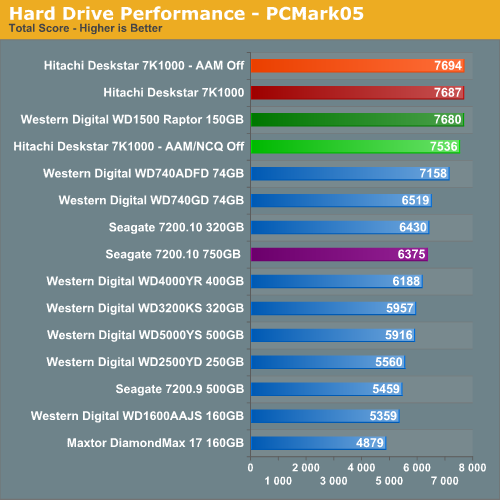
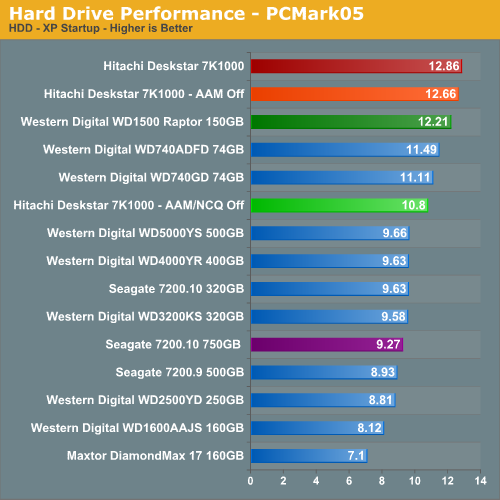
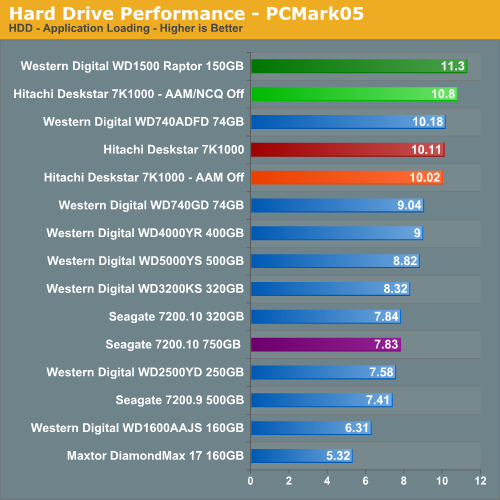
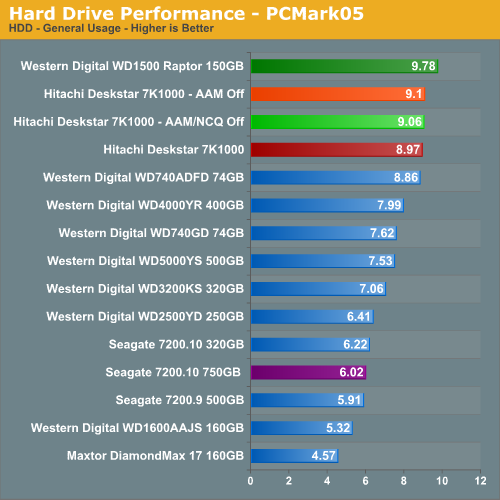
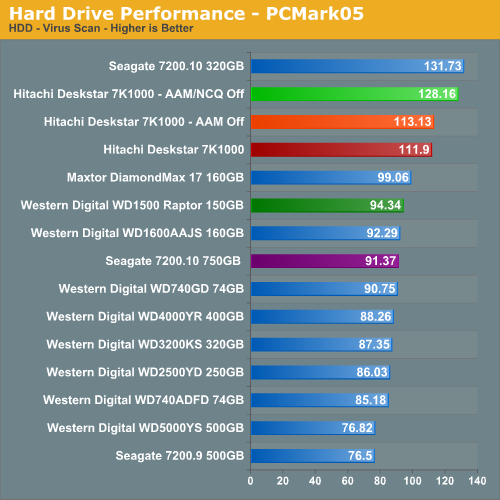
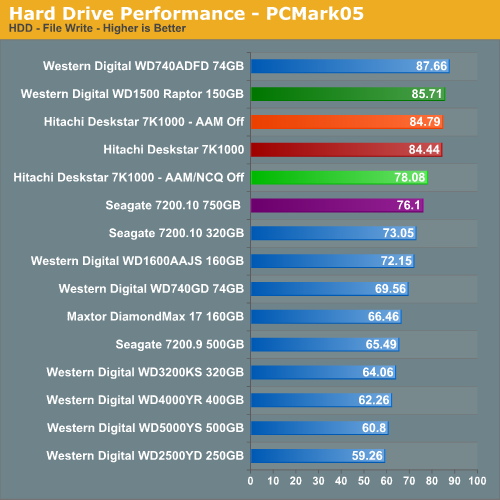
Our PCMark05 numbers surprised us with the 7K1000 scoring better than our previous champion, the WD 150GB Raptor. The performance delta between the 7K1000 and WD1500AHFD is minimal with the major differences occurring in the General Usage and Application sections of the test where combined write and read speeds favor the Raptor's rotational/access speeds while the 7K1000 scores extremely well in the Virus Scan tests especially when both AAM and NCQ are turned off.
We are providing test results with the 7K1000 in this series of benchmarks with AAM/NCQ on, AAM/NCQ off, and NCQ on only. The overall score goes to the NCQ only configuration but the AAM/NCQ on configuration only finishes 7 points behind. It was a toss up between the two configurations with the tests where read operations were prevalent benefiting the NCQ only setup. This is to be expected as random access times are about 30% slower with AAM on but it does not correlate to a noticeable difference in performance. This is one drive where you can have it quiet and fast at the same time. Our recommendation is to leave AAM and NCQ on unless you spend your day benchmarking virus scan programs.
We are utilizing the HDD test suite within PCMark05 for further comparative hard disk scores as it provides a mixture of actual application results and specific read/write percentages utilized within these programs. It is also a readily available benchmark that others can use for comparative purposes. The program utilizes the RankDisk application within the Intel iPeak SPT suite of tools to record a trace of disk activity during usage of real world applications. These traces are then replayed to generate performance measurements based upon the actual disk operations within each application. The HDD test suite contains 53% read and 47% write operations with each trace section utilizing varied amounts of read or write operations. Additional information about the test suite can be found in PDF format here PCMark05 whitepaper.
The PCMark05 test results are based upon the following trace runs:
Windows XP Startup: This test consists of 90% reading and 10% writes that tracks XP activities at start-up.
Application Loading: This test consists of 83% reading and 17% writes that tracks the opening and closing of the following programs.
- Microsoft Word
- Adobe Acrobat Reader
- Windows Media Player
- 3Dmark 2001SE
- Leadtek WinFast DVD
- Mozilla Internet Browser
- Opening a Microsoft Word document, performing grammar check, saving and closing
- Compression and decompression using WinZip
- Encrypting and decrypting a file using PowerCrypt
- Scanning files for viruses using F-Secure Antivirus
- Playing an MP3 file with Winamp
- Playing a WAV file with Winamp
- Playing a DivX video using the DivX codec and Windows Media Player
- Playing a WMV video file using Windows Media Player
- Viewing pictures using Windows Picture Viewer
- Browsing the Internet using Microsoft Internet Explorer
- Loading, playing and exiting a game with Tom Clancy's Ghost Recon
File Write: This test consists of 100% write activities by writing 680MB of files onto the hard disk.






Our PCMark05 numbers surprised us with the 7K1000 scoring better than our previous champion, the WD 150GB Raptor. The performance delta between the 7K1000 and WD1500AHFD is minimal with the major differences occurring in the General Usage and Application sections of the test where combined write and read speeds favor the Raptor's rotational/access speeds while the 7K1000 scores extremely well in the Virus Scan tests especially when both AAM and NCQ are turned off.
We are providing test results with the 7K1000 in this series of benchmarks with AAM/NCQ on, AAM/NCQ off, and NCQ on only. The overall score goes to the NCQ only configuration but the AAM/NCQ on configuration only finishes 7 points behind. It was a toss up between the two configurations with the tests where read operations were prevalent benefiting the NCQ only setup. This is to be expected as random access times are about 30% slower with AAM on but it does not correlate to a noticeable difference in performance. This is one drive where you can have it quiet and fast at the same time. Our recommendation is to leave AAM and NCQ on unless you spend your day benchmarking virus scan programs.










74 Comments
View All Comments
Justin Case - Monday, March 19, 2007 - link
"Considering the importance of data integrity in today's systems"...? You mean like, in yesterday's (or perhaps tomorrow's) systems, data corruption was considered normal or acceptable?Gary Key - Tuesday, March 20, 2007 - link
It was not meant to infer that data integrity was not or will not be important.Spoelie - Tuesday, March 20, 2007 - link
No, but if you lost a hard drive before, the amount of data that would be gone is nothing compared to the amount of data you lose with current hard drives. It's always a BAD thing to lose data, but it's BAD² to lose data². So it's important² to keep data² safe ;pJustin Case - Wednesday, March 21, 2007 - link
"Data integrity" and "drive failure" are two different things. Most data integrity issues are related to bad sectors and corrupted data (and that is why Hitachi chose to go with more platters and lower areal density - less chance of localized data corruption, but actually a slightly higher chance of "catastrophic" drive failure - namely a head crash or a dead motor). The article's author got _that_ part right.The problem was what came after it. It was just as important to "keep data safe" last year (or the year before that, etc.) as it is this year, so qualifying it as "in today's systems" makes no sense.
Gary Key - Wednesday, March 21, 2007 - link
I changed it back to the original text. ;)
Griswold - Monday, March 19, 2007 - link
Looking at the benchmark charts, one thing that pops into the eye is that your world at AT, as far as HDDs are concerned, seems to revolve around Seagate and WD only.But theres quite a few other manufacturers out there that make good drives (that surpass many of the featured drives in one way or another) - this new Hitachi beast proves it.
Go ahead and test more Samsung, Fujitsu, Hitachi and even Excelstor drives.
Gholam - Thursday, March 22, 2007 - link
ExcelStor drives are refurbished IBM/Hitachi.Gary Key - Tuesday, March 20, 2007 - link
We finally have agreements with Samsung and Hitachi to provide review samples so expect to see reviews of their drives ramp up quickly. We are discussing a review format for SCSI based drives at this time and if we can do it right then expect to see this drive category reviewed later this year. We will also be introducing SSD reviews into our storage mix in the coming weeks. While I am at it, our Actual Application Test Suite will under several changes and be introduced in the 500GB roundup. Thanks for the comments. :)
Final Hamlet - Monday, March 19, 2007 - link
Hmm. Only vendor I am interested in seeing him added is Samsung. They have quite a market share here in Germany.JarredWalton - Monday, March 19, 2007 - link
My personal take is that for 99% of users, it doesn't really matter which brand you use. Seagate may win a few benchmarks, WD some others, Samsung, etc. some as well. In reality, I don't notice the difference between any of the HDDs I own and use on a regular basis. I have purchased Samsung, WD, Seagate, Hitachi, and Maxtor. Outside of the Raptors being faster in a few specific instances, without running a low level diagnostic I would never notice a difference between the drives. I suppose I'm just not demanding enough of HDDs?